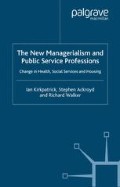Abstract
The provision of housing by public sector officials differs from our other two illustrative examples of public service professions in three important ways. First, there have been two distinct providers of public, or what is now referred to as social housing: local authorities and housing associations.1 While local authorities have dominated provision numerically, the profession emerged from the voluntary housing association sector and today that sector is expanding at the expense of local government provision. The second major difference identified is the uncertain nature of the housing management task and its domination by other professional groups, including: architects, engineers, planners and surveyors. While membership of the Chartered Institute of Housing (CIH) has continued to grow in recent years, the professional basis of housing management is frail and so too is the ability of this group to exert de facto control over provision (Franklin and Clapham, 1997; Walker, 2000). Finally, in contrast to the NHS and social services, which are primarily grant funded and allocate services to users bureaucratically, in housing there has always been a direct economic relationship between producers and users. Though the rents charged may be subsidised, there is a transaction backed up by a contractual landlord tenant relationship, which specifies the expected standards and behaviour of both parties.
The housing profession, if indeed such a collective body can be said to exist, has also experienced a rude awakening. Having entered the 1980s as a disparate, insular and rather reactionary collection of individuals, the 1990s have seen a more concerted attempt to establish a credible image for housing management. As the representative body for housing professionals, the CIH has raised the profile of the housing profession, establishing itself as a recognised source of expert advice and knowledge. Such a role has been largely supported by the government through the DoE and Audit Commission, recognised as contributing to the better management of public housing (Pearl, 1997: 207–208).
Access this chapter
Tax calculation will be finalised at checkout
Purchases are for personal use only
Preview
Unable to display preview. Download preview PDF.
Copyright information
© 2005 Ian Kirkpatrick, Stephen Ackroyd and Richard Walker
About this chapter
Cite this chapter
Kirkpatrick, I., Ackroyd, S., Walker, R. (2005). Social Housing. In: The New Managerialism and Public Service Professions. Palgrave Macmillan, London. https://doi.org/10.1057/9780230503595_6
Download citation
DOI: https://doi.org/10.1057/9780230503595_6
Publisher Name: Palgrave Macmillan, London
Print ISBN: 978-1-349-40944-0
Online ISBN: 978-0-230-50359-5
eBook Packages: Palgrave Business & Management CollectionBusiness and Management (R0)

